Podcast Topic: Social Safety Net & Food
Podcast Topic: Social Safety Net & Food
 E233: Grocery and meal insight from the Baby’s First Years project
E233: Grocery and meal insight from the Baby’s First Years project
March 28, 2024
A growing number of research studies show that the cognitive and brain development of low-income children differs from that of children in higher income families. For any family, that is a concerning statement. Today’s podcast features a project called Baby’s First Years, a multi-year effort to test the connections between poverty reduction and brain development among very young children. Here to talk about what the study has revealed so far is Dr. Lisa Gennetian from Duke University’s Sanford School of Public Policy, and Dr. Sarah Halpern-Meekin from the La Follette School of Public Affairs at the University of Wisconsin, Madison.
Related podcasts: Child Development & Nutrition | Diet & Nutrition | Food Insecurity | Social Safety Net & Food |
 E228: Code for America’s Summer EBT Playbook for State Implementation
E228: Code for America’s Summer EBT Playbook for State Implementation
February 5, 2024
In 2022, Congress established Summer EBT, the first new permanent federal food assistance program in almost 50 years. The authorization of Summer EBT represents a historic investment in the nutrition and wellbeing of almost 30 million children who will qualify for the program. But states that piloted Summer EBT, or operated Pandemic EBT programs in the early years of the COVID-19 pandemic know that getting these benefits into the hands of families will involve overcoming complex challenges related to data and technology. That’s why Code for America and No Kid Hungry, a campaign of Share Our Strength joined forces to create the Summer EBT Playbook, a comprehensive free resource designed to help state agencies plan for and implement a human-centered Summer EBT program. Today we will talk with Eleanor Davis, director of Government Innovation on the Safety Net team at Code for America. In her role, she helps government agencies adopt best practices for human-centered digital benefit delivery.
Related podcasts: Child Development & Nutrition | Food Policy | Social Safety Net & Food |
 E221: Understanding Poverty, Wellbeing, and Food Security for US Children
E221: Understanding Poverty, Wellbeing, and Food Security for US Children
November 30, 2023
As the parent of a 12-year-old child, I know that raising a child is one of the most profound and rewarding experiences of a person’s life. It is also shockingly expensive. The high cost of child rearing is particularly difficult for families with limited resources. To help us think through this issue, it is my great pleasure to welcome a colleague here at Duke: Dr. Christina Gibson-Davis, Professor of Public Policy. Christina studies economic inequality, and particularly how it affects families with children.
Related podcasts: Child Development & Nutrition | Diet & Nutrition | Equity, Race & Food Justice | Food Insecurity | Food Policy | School Meals | Social Safety Net & Food |
 E220: Largest study to date on Produce Prescription Program health impacts
E220: Largest study to date on Produce Prescription Program health impacts
November 6, 2023
Diet-related disease such as cardiovascular disease and diabetes create a crushing burden on individuals, families, and the healthcare system in the United States. However, Produce Prescription Programs where medical professionals prescribe fruits and vegetables and health insurers pay, promise to improve nutrition and health. Today we will talk with Dr. Kurt Hager from the University of Massachusetts Chan Medical School and lead author of the largest assessment of Produce Prescription Programs to date.
Related podcasts: Child Development & Nutrition | Childhood Obesity | Diet & Nutrition | Food Insecurity | Social Safety Net & Food |
 E218: SNAP benefits still not enough for many families
E218: SNAP benefits still not enough for many families
October 19, 2023
With record-breaking food prices in 2022, it has become more expensive for families to buy the foods that they need. The Supplemental Nutrition Assistance Program, or SNAP, helps families purchase foods but families frequently spend their benefits before the next benefit cycle. USDA modifies SNAP benefits every year as a cost-of-living adjustment. But was the change in fiscal year 2023 enough to keep pace with food price inflation? Today, we talk with Elaine Waxman from the Urban Institute to find out.
Related podcasts: Child Development & Nutrition | Food Insecurity | Food Policy | Social Safety Net & Food |
 E215: When Kids Age Out of WIC Support
E215: When Kids Age Out of WIC Support
September 25, 2023
The third largest food assistance program in the United States is the Special Supplemental Nutrition Program for Women, Infants, and Children, or WIC for short. WIC is designed to safeguard the health of low-income women, infants, and children up to the age of five who are at risk of inadequate nutrition. WIC provides funds for specific foods to supplement diets, information on healthy eating, and referrals to healthcare. However, regardless of school attendance and access to school meals, children age out of the program the month after their fifth birthday. Today, I am talking with the University of Georgia’s Travis Smith, an agricultural economist who, along with his co-author, Pourya Valizedah studied the effects of aging out of WIC on children’s diets.
Related podcasts: Child Development & Nutrition | Food Insecurity | Food Policy | School Meals | Social Safety Net & Food |
 E212: Do SNAP work requirements encourage self sufficiency or hurt those who need help the most?
E212: Do SNAP work requirements encourage self sufficiency or hurt those who need help the most?
August 17, 2023
The Supplemental Nutrition Assistance Program is one of the largest poverty alleviation programs in the United States and provides help to around 14% of the US population. Since 1996, the program has required able-bodied adults without dependents to work in order to receive food assistance. Proponents of work requirements say it prevents government dependency. Critics, however, argue work requirements push out the people who need food assistance the most. Today we’ll talk with two economists about the impact of SNAP work requirements: University of Rochester’s Elena Prager. and Adam Leive at the University of California, Berkeley.
Related podcasts: Equity, Race & Food Justice | Food Policy | Social Safety Net & Food |
 E198: Why SNAP pandemic benefits for college students should continue
E198: Why SNAP pandemic benefits for college students should continue
March 7, 2023
There has been increasing attention to the issue of food insecurity among college students. Estimates vary, but to provide some perspective, one report found that a staggering 30% of all college students experienced food insecurity at some point in their college careers. In response to the COVID-19 pandemic, the US temporarily extended the Supplemental Nutrition Assistance Program benefits to college-aged students. But now this pandemic help is set to expire, impacting more than three million college students who have relied on this program for food. Today we speak with Heather Taylor, a former US delegate to the United Nations, and now managing director of Bread for the World. Having experienced severe food insecurity as an undergraduate student at Georgetown University, she now advocates for SNAP expansion for college students and other marginalized groups facing food insecurity.
Related podcasts: Diet & Nutrition | Equity, Race & Food Justice | Food Insecurity | Food Policy | Social Safety Net & Food |
 E197: USDA plans for online WIC Benefits
E197: USDA plans for online WIC Benefits
February 28, 2023
In February, 2023, the US Department of Agriculture announced plans to streamline and modernize WIC – the Women Infants and Children Program focused on supplemental nutrition. We’ll talk about the future of WIC today with Stacy Dean, the Deputy Undersecretary for USDA’s Food, Nutrition and Consumer Services.
Related podcasts: Child Development & Nutrition | COVID-19 Pandemic Impacts on Food | Equity, Race & Food Justice | Food Insecurity | Food Policy | Social Safety Net & Food |
 E192: How to achieve food equity with SNAP
E192: How to achieve food equity with SNAP
January 4, 2023
Today we’re speaking with coauthors of a new report by the Center for Law and Social Policy, entitled “A Community-Driven Anti-Racism Vision for SNAP.” Senior policy analyst, Parker Gilkesson, and community organizer, Tamika Moore, argue that although public benefits such as the Supplemental Nutrition Assistance Program provide critical care and support for families with low incomes, they also reinforce racism and structures of oppression.
Related podcasts: Advocacy & Food | Diet & Nutrition | Equity, Race & Food Justice | Food Insecurity | Food Policy | Social Safety Net & Food |

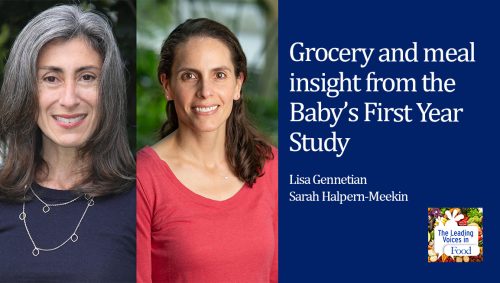 E233: Grocery and meal insight from the Baby’s First Years project
E233: Grocery and meal insight from the Baby’s First Years project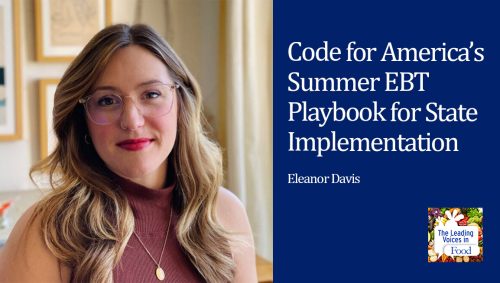 E228: Code for America’s Summer EBT Playbook for State Implementation
E228: Code for America’s Summer EBT Playbook for State Implementation E221: Understanding Poverty, Wellbeing, and Food Security for US Children
E221: Understanding Poverty, Wellbeing, and Food Security for US Children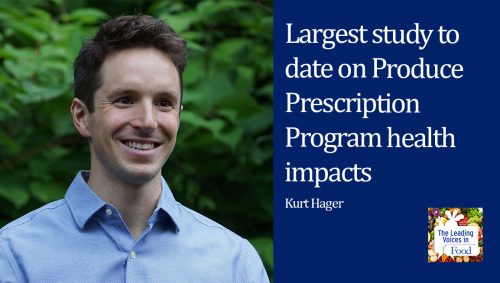 E220: Largest study to date on Produce Prescription Program health impacts
E220: Largest study to date on Produce Prescription Program health impacts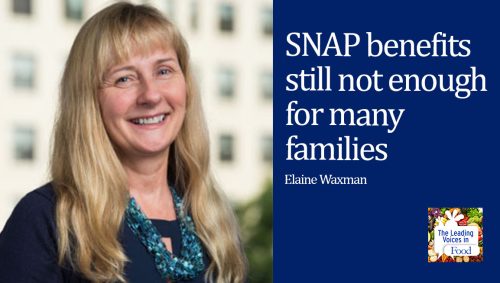 E218: SNAP benefits still not enough for many families
E218: SNAP benefits still not enough for many families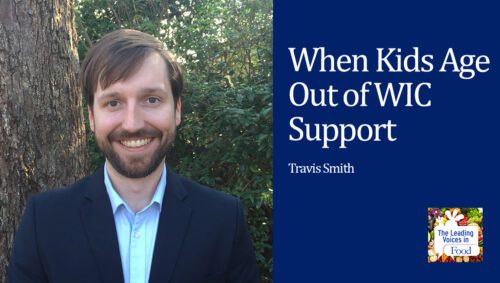 E215: When Kids Age Out of WIC Support
E215: When Kids Age Out of WIC Support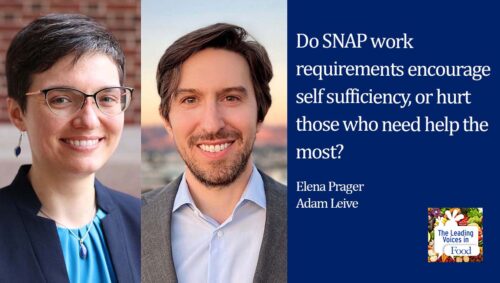 E212: Do SNAP work requirements encourage self sufficiency or hurt those who need help the most?
E212: Do SNAP work requirements encourage self sufficiency or hurt those who need help the most?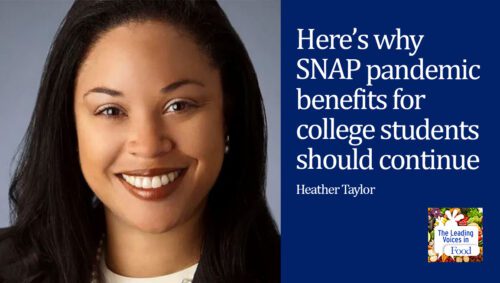 E198: Why SNAP pandemic benefits for college students should continue
E198: Why SNAP pandemic benefits for college students should continue E197: USDA plans for online WIC Benefits
E197: USDA plans for online WIC Benefits E192: How to achieve food equity with SNAP
E192: How to achieve food equity with SNAP